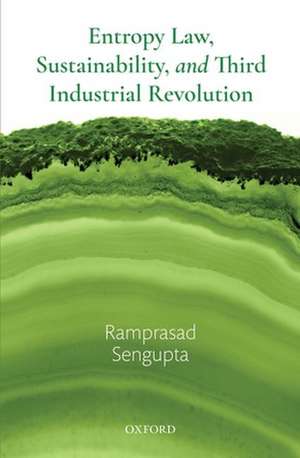Entropy Law, Sustainability, and Third Industrial Revolution
Autor Ramprasad Senguptaen Limba Engleză Hardback – 3 aug 2020
Preț: 453.77 lei
Nou
Puncte Express: 681
Preț estimativ în valută:
86.86€ • 94.38$ • 73.01£
86.86€ • 94.38$ • 73.01£
Carte disponibilă
Livrare economică 31 martie-14 aprilie
Preluare comenzi: 021 569.72.76
Specificații
ISBN-13: 9780190121143
ISBN-10: 0190121149
Pagini: 296
Dimensiuni: 148 x 222 x 27 mm
Greutate: 0.66 kg
Editura: OUP INDIA
Colecția OUP India
Locul publicării:Delhi, India
ISBN-10: 0190121149
Pagini: 296
Dimensiuni: 148 x 222 x 27 mm
Greutate: 0.66 kg
Editura: OUP INDIA
Colecția OUP India
Locul publicării:Delhi, India
Recenzii
It makes a substantial contribution to economics by highlighting scarcity of natural resources and limit to economic growth because of the entropy law. Most conclusions are based on econometric/ statistical analysis of cross-country and inter-state Indian data. Literacy style is lucid and the chapters are well structured.
The work represents a substantial and masterful contribution to scholarship within the field of economics and sustainability, economic, social and environmental, as well as modeling, theory and empirical nature of various aspects. Its scope of work is impressive, its depth of knowledge is clear, and its ability to take the concepts from ideas to practical illustrations of analytics and empirics is superb.
The work represents a substantial and masterful contribution to scholarship within the field of economics and sustainability, economic, social and environmental, as well as modeling, theory and empirical nature of various aspects. Its scope of work is impressive, its depth of knowledge is clear, and its ability to take the concepts from ideas to practical illustrations of analytics and empirics is superb.
Notă biografică
Ramprasad Sengupta is emeritus professor of economics at the Centre for Economic Studies and Planning at the School of Social Sciences, Jawaharlal Nehru University (JNU), New Delhi.
